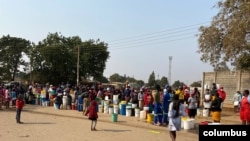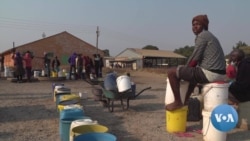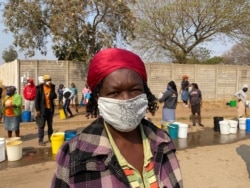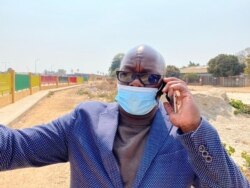City authorities in Zimbabwe's capital say they are facing a severe water shortage, and public health concerns, as water levels in dams supplying Harare have “drastically” dropped during the COVID-19 pandemic. Charities have stepped-up free water deliveries to poor neighborhoods but, authorities say social distancing is a challenge at public water points.
Recurring droughts and failure to import water chemicals has resulted in some parts of Harare without tap water.
Residents have to depend on open water sources or overcrowded manually pumped boreholes.
Twenty-three-year-old Chester Musha is one of those that wake up around 3AM to queue for water or the borehole dries up that day.
“We really need serious assistance. You see people are disregarding the coronavirus measures put on to keep us safe," said Musha. "Constitutionally I know we are entitled to safety health or environment by this is not giving us that as promised by the constitution. Also, we cannot sit there and relax. Recently we had a girl from South Africa. She was under home quarantine. She had no water and no electricity and you cannot expect a person to live under such circumstances. So we really need serious assistance here in Mabvuku.”
In some areas, underground water tables have gone down and boreholes are struggling to provide the precious water. Some organizations like Clean City - have chipped in with four buckets of free water per family. Forty-five year old Florence Phiri says residents appreciate that gesture.
“But my appeal to Clean City must increase the number of bowsers that bring water here because sometimes some people go home with no water," Phiri said. "That results in them looking for water in open sources like wells. Our troubles are less when they come. But we wish Clean City would come daily. They are really helping us. If they keep coming, we will be able to contain COVID 19 in this area.”
Clean City said it would not comment on residents’ appeal for more supplys
Michael Chideme, is the spokesman for the City of Harare. He says Zimbabwe’s capital is failing to get adequate foreign currency needed to import $3 million worth of water treating chemicals every month.
“So we end up buying very little and also treating restricted amounts of water so that we can last longer with the amounts that we have," said Chideme. "Our other problem has to do with our water bodies, Seke and Harava dams which complement Manyame and Lake Chivero dams have already dried up and we are no longer drawing water from there. We also have a problem of a dilapidated water reticulation system. Most of our pipes were layed way back in the 1970s or early 1980s. Now they have outlived their lifespan. Hence the water bursts that we are experiencing almost on a daily basis.”
With rains not expected until October in Zimbabwe, that means Harare’ water shortages are likely to worsen. That certainly should be bad news when the country is battling to contain coronavirus which requires strict hygiene practices.









